

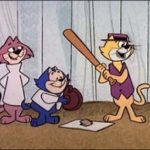

A little random wading today through the broad world of Hanna-Barbera cartoons, in no specific chronological sequence, and no doubt skipping past several series which will probably be touched upon in later installments of these articles, to highlight some more instances where baseball themes are presented. Among characters we will meet today are Augie Doggie, Top Cat, Winnie Witch, The Impossibles, Dick Dastardly, and at least a beginning venture into Scooby Doo.
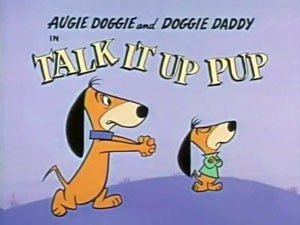 Talk It Up, Pup (Augie Doggie, from “The Quick Draw McGraw Show”, 10/31/59) – It’s a bad day for the home team in the Itty Bitty League. Down in the bottom of the ninth, batter Augie is their last chance. With a count of 3 and 2, a ball sails past Augie. “STRIKE! YER OUT!” shouts Doggie Daddy, serving as umpire. “That was a strike?”, questions Augie in a condescending manner. “But Augie, it was right over the plate”, responds Daddy. Much like Sylvester Jr., Augie reverts to overacting and over-embarassment. “Oh, the unsportsmanlike shame of it. We lost the game, ‘cause my Dad doesn’t know from umpiring!” Daddy retaliates with an unkind remark. “The guy that said children should be seen and not heard was right.” Augie takes Dad at his word, and thus vows that for the next 24 hours, he shall be seen, but not heard.
Talk It Up, Pup (Augie Doggie, from “The Quick Draw McGraw Show”, 10/31/59) – It’s a bad day for the home team in the Itty Bitty League. Down in the bottom of the ninth, batter Augie is their last chance. With a count of 3 and 2, a ball sails past Augie. “STRIKE! YER OUT!” shouts Doggie Daddy, serving as umpire. “That was a strike?”, questions Augie in a condescending manner. “But Augie, it was right over the plate”, responds Daddy. Much like Sylvester Jr., Augie reverts to overacting and over-embarassment. “Oh, the unsportsmanlike shame of it. We lost the game, ‘cause my Dad doesn’t know from umpiring!” Daddy retaliates with an unkind remark. “The guy that said children should be seen and not heard was right.” Augie takes Dad at his word, and thus vows that for the next 24 hours, he shall be seen, but not heard.
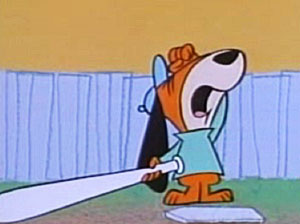 Daddy becomes a picture of frustration, as he cannot get Augie to break the unresponding, cold-shoulder silent treatment. Bribery by way of a chocolate soda at a soda fountain fails to make a mark on Augie’s vocal chords. Daddy thus resorts to a series of mishaps calculated to elicit a timely call of warning from Augie, including walking into an open manhole, under a falling safe, and finally walking with a lighted match into a dynamite shack. But all efforts fail to produce a warning call, Augie remaining resolute to carry out his promise in spite of his love for Dear Ol’ Dad. The end result is Daddy all bandaged up in traction in a hospital bed (and it almost looks like he has lost his nose in the process, as someone forgets to paint it in on the cel in the hospital bed). Augie appears at the door of the room, still cold and absolutely mute. However, he looks down at his watch, and apparently, the 24 hours are just ending. At the precise instant the time runs out, Augie bursts out with a non-stop flow of happy greetings to Dad, and invitations to conversation with lines such as “What’s new?” and “How’s tricks?” Daddy is so pleasantly surprised, he calls out Augie’s name, and extends open arms for a hug – forgetting he is in weighted traction. The weights shift, and Daddy is hoisted by them out of the bed, and left hanging upside down. But Augie keeps right on cheerily talking, and Daddy closes with the line, “That’s my boy sayin’ all that – and it makes ‘ya feel good.”
Daddy becomes a picture of frustration, as he cannot get Augie to break the unresponding, cold-shoulder silent treatment. Bribery by way of a chocolate soda at a soda fountain fails to make a mark on Augie’s vocal chords. Daddy thus resorts to a series of mishaps calculated to elicit a timely call of warning from Augie, including walking into an open manhole, under a falling safe, and finally walking with a lighted match into a dynamite shack. But all efforts fail to produce a warning call, Augie remaining resolute to carry out his promise in spite of his love for Dear Ol’ Dad. The end result is Daddy all bandaged up in traction in a hospital bed (and it almost looks like he has lost his nose in the process, as someone forgets to paint it in on the cel in the hospital bed). Augie appears at the door of the room, still cold and absolutely mute. However, he looks down at his watch, and apparently, the 24 hours are just ending. At the precise instant the time runs out, Augie bursts out with a non-stop flow of happy greetings to Dad, and invitations to conversation with lines such as “What’s new?” and “How’s tricks?” Daddy is so pleasantly surprised, he calls out Augie’s name, and extends open arms for a hug – forgetting he is in weighted traction. The weights shift, and Daddy is hoisted by them out of the bed, and left hanging upside down. But Augie keeps right on cheerily talking, and Daddy closes with the line, “That’s my boy sayin’ all that – and it makes ‘ya feel good.”
• “Talk It Up, Pup” is angled on Dailymotion.
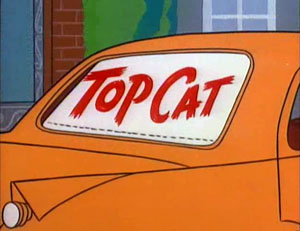 The Late T.C. (Top Cat, 2/21/62) – Order of business on the agenda of a meeting of Top Cat’s gang is to raise dough for one lucky member of their group to take a $6 luxury cruise on the Hudson River. In other words, a baseball pool. Top Cat scribbles down assorted scores on six pieces of paper, and tosses them into his hat. Of course, to be “fair”, he picks first. Choo Choo draws 127 to 125. He thinks he must be getting lucky, as his scores in the last pool were in the 300’s. Another draws a paper reading “Game called on account of earthquake”, while Spook draws a zero to zero tie. Top Cat of course has a paper with every combination of numbers from one to ten. Brain asks how come none of the others ever get to toss the scores into the hat. And Top Cat, responds. “Do any of you own a hat?” However, T.C. is big about it, and invites the entire gang to the game at Yankee Stadium. They all run for their transportation, on the back bumper of a city bus, with T.C. stating he will collect fares once they get to the stadium.
The Late T.C. (Top Cat, 2/21/62) – Order of business on the agenda of a meeting of Top Cat’s gang is to raise dough for one lucky member of their group to take a $6 luxury cruise on the Hudson River. In other words, a baseball pool. Top Cat scribbles down assorted scores on six pieces of paper, and tosses them into his hat. Of course, to be “fair”, he picks first. Choo Choo draws 127 to 125. He thinks he must be getting lucky, as his scores in the last pool were in the 300’s. Another draws a paper reading “Game called on account of earthquake”, while Spook draws a zero to zero tie. Top Cat of course has a paper with every combination of numbers from one to ten. Brain asks how come none of the others ever get to toss the scores into the hat. And Top Cat, responds. “Do any of you own a hat?” However, T.C. is big about it, and invites the entire gang to the game at Yankee Stadium. They all run for their transportation, on the back bumper of a city bus, with T.C. stating he will collect fares once they get to the stadium.
Being invited to the game is not what the gang expects. All of them have to stand on each other’s shoulders behind the outfield fence, to prop up Top Cat at the top of the pile, who is the only one who can see the game, but provides the gang with play-by-play. Mickey Mantle comes to bat, and socks a long one into center field – which comes down right upon Top Cat’s head. T.C. wearily instructs the gang to rush him to a doctor. Three of them carry T.C. on their shoulders, while Benny in front does his best vocal impression of a siren. Choo-Choo is left behind, and as Officer Dibble investigates the commotion, informs Dibble that T.C. has been hit on the head and rushed to a doctor. Suspecting Top Cat to be up to his usual tricks, Dibble follows, wondering if T.C. will try to sell the doctor the Brooklyn Bridge.
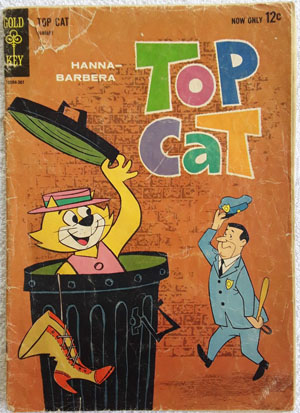
This episode was closely adapted into comic book form by Gold Key Comics, in Top Cat #5, under the re-titling, “A Sick-Type Joke”.
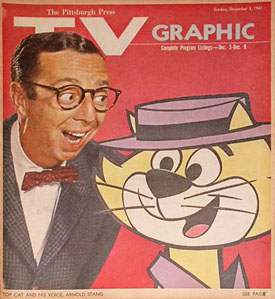 T.C. begins milking Dibble’s sympathies for all they are worth. He has Dibble passing the hat for him in every precinct, catering him fancy “last meals”, and finally organizing an open-alley going away party (something T.C. hopes they can make a regular weekly event). Fancy-Fancy arranges dates for everyone, and Top Cat tells Dibble he can bring along anybody he likes to the bash. Wondering who to bring, Dibble suddenly thinks of the doctor, and decides T.C. might like it if he attends. But the doctor is amazed at the whole idea of throwing a party for T.C., and reveals that he never gave Top Car a death sentence – only the clock. Dibble’s sympathetic expression turns to a ferocious growl. He crashes the party in progress, sending the gang and guests scattering for the far parts of town. T.C. is cornered in his ash can, and to make sure he won’t talk his way out of this one, Dibble slams the lid down on the can, and begins carrying it down the alley. Dibble promises to give T.C. that Hudson River cruise he’s been wanting – which he provides by tossing the ash can and T.C. into the back of a departing trash truck. When last we see Top Cat, the gang are waving him bon voyage from the docks, as T.C. in his can sails out down the Hudson atop mounds of trash in a garbage scow, ready to be dumped at sea. T.C. remarks to the audience that it’s not the kind of cruise he had in mind, but at least he avoids the crowds. He attempts to laugh at his own wise-crack, but then, noticing the audience is not laughing with him, sarcastically remarks, “Nothin’.”
T.C. begins milking Dibble’s sympathies for all they are worth. He has Dibble passing the hat for him in every precinct, catering him fancy “last meals”, and finally organizing an open-alley going away party (something T.C. hopes they can make a regular weekly event). Fancy-Fancy arranges dates for everyone, and Top Cat tells Dibble he can bring along anybody he likes to the bash. Wondering who to bring, Dibble suddenly thinks of the doctor, and decides T.C. might like it if he attends. But the doctor is amazed at the whole idea of throwing a party for T.C., and reveals that he never gave Top Car a death sentence – only the clock. Dibble’s sympathetic expression turns to a ferocious growl. He crashes the party in progress, sending the gang and guests scattering for the far parts of town. T.C. is cornered in his ash can, and to make sure he won’t talk his way out of this one, Dibble slams the lid down on the can, and begins carrying it down the alley. Dibble promises to give T.C. that Hudson River cruise he’s been wanting – which he provides by tossing the ash can and T.C. into the back of a departing trash truck. When last we see Top Cat, the gang are waving him bon voyage from the docks, as T.C. in his can sails out down the Hudson atop mounds of trash in a garbage scow, ready to be dumped at sea. T.C. remarks to the audience that it’s not the kind of cruise he had in mind, but at least he avoids the crowds. He attempts to laugh at his own wise-crack, but then, noticing the audience is not laughing with him, sarcastically remarks, “Nothin’.”
• “The Late T.C.” is on Internet Archive.
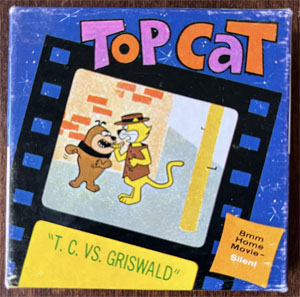 Griswald (Top Cat, 4/11/62) – The episode opens with TC, Benny, and Braun engaged in a game of back-alley baseball just to pass the time. Brain pitches a slow ball, which T.C. thinks should be called a snail ball, and refuses to swing at – not his style. A fast ball knocks catcher Benny and umpire Choo-Choo into a city mailbox, from which Choo-Choo calls “Strike two.” Brain finally tosses a decent one, and Top Cat belts it – just as Dibble comes along to break up the game, declaring it’s against the law to play in the alley. And with good reason, as Top Cat’s ball smashes the window of Tony’s Pizzeria, the ball landing in Tony’s eye – and with Dibble left holding the bat.
Griswald (Top Cat, 4/11/62) – The episode opens with TC, Benny, and Braun engaged in a game of back-alley baseball just to pass the time. Brain pitches a slow ball, which T.C. thinks should be called a snail ball, and refuses to swing at – not his style. A fast ball knocks catcher Benny and umpire Choo-Choo into a city mailbox, from which Choo-Choo calls “Strike two.” Brain finally tosses a decent one, and Top Cat belts it – just as Dibble comes along to break up the game, declaring it’s against the law to play in the alley. And with good reason, as Top Cat’s ball smashes the window of Tony’s Pizzeria, the ball landing in Tony’s eye – and with Dibble left holding the bat.
Dibble receives a call from the Sergeant to report to the station. There, he receives the news that he has been selected as the pigeon – er, patrolman – for assignment to the Commissioner’s latest program to crack down on crime – use of police dogs. Dibble is introduced to Griswald, a real go-getter of a tough bulldog, anxious to make the force. (Griswald is rather an early prototype of Muttley, complete with the traditional snicker associated with most H-B tough dogs.) Seeing Griswald not afraid to use his jagged choppers, Dibble thinks the dog may be the answer to his problems – in curbing the law-breaking behavior of Top Cat. Dibble thus assigns Griswald to stick to Top Cat like glue, and especially to keep anyone from using the police phone except himself. Griswald repeatedly pits the bite upon T.C.’s bottom, and becomes impossible to lose – even following T.C. and the gang to Yankee Stadium, where he interferes with T.C.’s pivoting of a loose fence board to gain his gang free admission (although the loose board briefly clobbers Griswald on its way down).
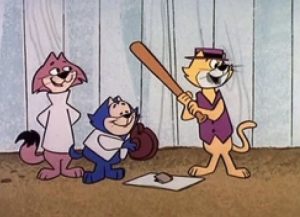 Nothing seems to work to rid T.C. of the beast, until he overhears Dibble on the police phone, informed that the Commissioner and his wife will meet Dibble and the Sergeant in the alley, to get a firsthand view of the performance of Griswald. T.C. sees a chance – if he can get Dibble out of the way. T.C. goes to a telephone booth, assumes a tough-guy voice, and somehow telephones Dibble’s call box, claiming to have a hot tip on where to capture a gang Dibble’s been trying to arrest for years, sending Dibble on a wild goose chase. T.C. and the boys now wait around a corner of the alley fence, for events to take care of themselves. The Sergeant is first to arrive, and, finding no Dibble, phones the station to see if Dibble called in. To Griswald’s eyes, all he sees is someone using the phone who is not Dibble. CHOMP! As the Sergeant runs, next comes the Commissioner, calling to find the Sergeant. CHOMP:! The Commissioner’s wife places a call to inform headquarters that her husband has been attacked. Dibble has now returned, complaining about the false alarm, and, seeing the Commissioner’s wife in peril, picks her up bodily over his head, receiving Griswald’s painful bite himself. Quoting Quick Draw McGraw, Dibble remarks “Ooooh, that smarts!”
Nothing seems to work to rid T.C. of the beast, until he overhears Dibble on the police phone, informed that the Commissioner and his wife will meet Dibble and the Sergeant in the alley, to get a firsthand view of the performance of Griswald. T.C. sees a chance – if he can get Dibble out of the way. T.C. goes to a telephone booth, assumes a tough-guy voice, and somehow telephones Dibble’s call box, claiming to have a hot tip on where to capture a gang Dibble’s been trying to arrest for years, sending Dibble on a wild goose chase. T.C. and the boys now wait around a corner of the alley fence, for events to take care of themselves. The Sergeant is first to arrive, and, finding no Dibble, phones the station to see if Dibble called in. To Griswald’s eyes, all he sees is someone using the phone who is not Dibble. CHOMP! As the Sergeant runs, next comes the Commissioner, calling to find the Sergeant. CHOMP:! The Commissioner’s wife places a call to inform headquarters that her husband has been attacked. Dibble has now returned, complaining about the false alarm, and, seeing the Commissioner’s wife in peril, picks her up bodily over his head, receiving Griswald’s painful bite himself. Quoting Quick Draw McGraw, Dibble remarks “Ooooh, that smarts!”
Griswald receives the sad news that he is not of police caliber. Dibble remarks that it’s too bad that Griswald will be left homeless, while at the alley, an operator like Top Cat has it real soft. Griswald brightens, as a devilish thought crosses his snickering mind. That noght, as Top Cat attempts to bed down in his ash can, instead of a good night’s rest, he receives another chomp. Griswald has taken over his home, and ends the film by placing Top Cat’s nightcap on his head, wishing everyone good night, and descending into the can snickering.
• “Griswald” is on Internet Archive.
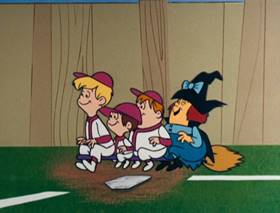 The Little Big League (Winsome Witch, 10/30/65) – A team of kids scheduled for a sandlot game has a problem. Their star and only pitcher is laid up with a broken arm (hopefully not incurred while engaged in the sport). Their opponents have already arrived, and are anxious to begin, while the home team stalls for time. Enter Winnie Witch, happening by in the sky on her broomstick. She overhears the commotion below, as the home team reveals that they need a pitcher. Though Winnie has never played a game in her life, she feels this is the call that somebody needs her assistance. Swooping down, she volunteers for pitching duties. The kids, though not phased by her odd appearance and flying broomstick, are not all too sure this odd lady is the solution to their problem, and the opposing side thinks they can easily clobber a lady pitcher. But Winnie remains confident, and continues to request a tryout. Having no other alternatives, the home team agrees.
The Little Big League (Winsome Witch, 10/30/65) – A team of kids scheduled for a sandlot game has a problem. Their star and only pitcher is laid up with a broken arm (hopefully not incurred while engaged in the sport). Their opponents have already arrived, and are anxious to begin, while the home team stalls for time. Enter Winnie Witch, happening by in the sky on her broomstick. She overhears the commotion below, as the home team reveals that they need a pitcher. Though Winnie has never played a game in her life, she feels this is the call that somebody needs her assistance. Swooping down, she volunteers for pitching duties. The kids, though not phased by her odd appearance and flying broomstick, are not all too sure this odd lady is the solution to their problem, and the opposing side thinks they can easily clobber a lady pitcher. But Winnie remains confident, and continues to request a tryout. Having no other alternatives, the home team agrees.
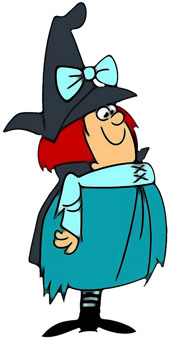 Though not visibly yet resorting to magic, Winnie seems to have a lot on the ball. Her first pitch plays a good game of ducking the bat, dodging under two swings, then hopping over the bat when the batter tries to slam down upon the ball vertically, the ball landing squarely in the batter’s hip pocket. Winnie’s next pitch is the old classic slow ball, again using up all three of the batter’s strikes on one ball. As thus is going on, a pair of big league scouts happen by the ball park between scouting errands, and decide to kill a little time watching the potential future big leaguers. They are amazed at Winnie’s pitching prowess, calling some of her pitches the best they’ve ever seen. The sides change, and the home team comes up to bat. Winnie decides to give her teammates a little magical boost, with the spell, “Zippity Zip. Zippity Zam. Everyone hits the ball with a ‘Wham’!” Three consecutive batters get solid hits for singles. Winnie comes up in clean-up position, with the spectators calling for a homer. Using her broom handle as bat, Winnie clouts the ball without even half-trying. She hops on her broom and starts circling the bases. (Notably, she does not play legally like Wendy’s friend Witch Hazel in Casper’s “Which is Witch”, in that she does not lower her foot to tag each base.) She picks up the other three runners on the handle of her broom, and all of them arrive at the plate simultaneously. The scouts have seen all they need to see, and approach Winnie with an offer to play in the big leagues. Winnie puts it to a vote of her team, who approve her chance to make the big time. But the team and Winnie think that everybody will be heading for the big town stadium for Winnie’s debut. Instead, once Winnie is in the scouts’ car, they pull away, leaving the rest of the team in the dust at the curb. They tell Winnie that they didn’t want the whole team – only her – and intend to act as her managers for her star career. “Is that so?” states Winnie, with a crafty look in her eyes. Suddenly, she appears to shrink out of sight from the car window, and as the scouts look into the back seat, they declare. “She’s gone!” Winnie wants no part of the big boys’ game, and returns to her loyal supporters in the sandlot ranks. She gives all her teammates a broom ride home, as they hail her as the best pitcher ever. Winnie sniffles to hold back a tear, stating that it’s wonderful to know that you’re wanted.
Though not visibly yet resorting to magic, Winnie seems to have a lot on the ball. Her first pitch plays a good game of ducking the bat, dodging under two swings, then hopping over the bat when the batter tries to slam down upon the ball vertically, the ball landing squarely in the batter’s hip pocket. Winnie’s next pitch is the old classic slow ball, again using up all three of the batter’s strikes on one ball. As thus is going on, a pair of big league scouts happen by the ball park between scouting errands, and decide to kill a little time watching the potential future big leaguers. They are amazed at Winnie’s pitching prowess, calling some of her pitches the best they’ve ever seen. The sides change, and the home team comes up to bat. Winnie decides to give her teammates a little magical boost, with the spell, “Zippity Zip. Zippity Zam. Everyone hits the ball with a ‘Wham’!” Three consecutive batters get solid hits for singles. Winnie comes up in clean-up position, with the spectators calling for a homer. Using her broom handle as bat, Winnie clouts the ball without even half-trying. She hops on her broom and starts circling the bases. (Notably, she does not play legally like Wendy’s friend Witch Hazel in Casper’s “Which is Witch”, in that she does not lower her foot to tag each base.) She picks up the other three runners on the handle of her broom, and all of them arrive at the plate simultaneously. The scouts have seen all they need to see, and approach Winnie with an offer to play in the big leagues. Winnie puts it to a vote of her team, who approve her chance to make the big time. But the team and Winnie think that everybody will be heading for the big town stadium for Winnie’s debut. Instead, once Winnie is in the scouts’ car, they pull away, leaving the rest of the team in the dust at the curb. They tell Winnie that they didn’t want the whole team – only her – and intend to act as her managers for her star career. “Is that so?” states Winnie, with a crafty look in her eyes. Suddenly, she appears to shrink out of sight from the car window, and as the scouts look into the back seat, they declare. “She’s gone!” Winnie wants no part of the big boys’ game, and returns to her loyal supporters in the sandlot ranks. She gives all her teammates a broom ride home, as they hail her as the best pitcher ever. Winnie sniffles to hold back a tear, stating that it’s wonderful to know that you’re wanted.
• “The Little Big League” is on Internet Archive
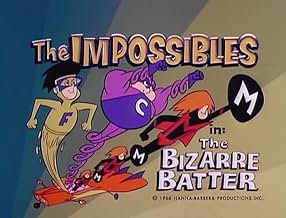 The Bizarre Batter (The Impossibles, from “Frankenstein Jr. and the Impossibles”, 1/7/67) – Give thanks that this one doesn’t seem to be around for website viewing, which spares you all having to watch it. At Dodgem Stadium, the Impossibles (in their civilian rock-group guise) put on a pre-game performance, then watch from the stands as Randy Bofax comes up to bat. Curious that Randy should have a name similar to a legendary Dodger pitcher, as he is here cast as a star batter. As he prepares to sock a hit, a villain known as the Bizarre Batter watches through a sliding panel in the outfield fence, from a secret control room which no one seems to have noticed is constructed directly behind the fence boards. Randy gets a hit, rounds the bases for what looks like an inside-the-park homer, and slides for the plate. The dust rises from the baseline, and the umpire calls “Safe”. The catcher protests the call – how can he be safe, when in fact, Randy isn’t even there, having vanished entirely in the dust. The audience sees what really happened, as Randy is still sliding – down an inclined tunnel which opened under home plate, at a pull of a lever from the villain. In his control room, the villain picks up a microphone wired to the stadium P.A. system, and announces that Randy will be returned – when he is paid a ransom of one million dollars.
The Bizarre Batter (The Impossibles, from “Frankenstein Jr. and the Impossibles”, 1/7/67) – Give thanks that this one doesn’t seem to be around for website viewing, which spares you all having to watch it. At Dodgem Stadium, the Impossibles (in their civilian rock-group guise) put on a pre-game performance, then watch from the stands as Randy Bofax comes up to bat. Curious that Randy should have a name similar to a legendary Dodger pitcher, as he is here cast as a star batter. As he prepares to sock a hit, a villain known as the Bizarre Batter watches through a sliding panel in the outfield fence, from a secret control room which no one seems to have noticed is constructed directly behind the fence boards. Randy gets a hit, rounds the bases for what looks like an inside-the-park homer, and slides for the plate. The dust rises from the baseline, and the umpire calls “Safe”. The catcher protests the call – how can he be safe, when in fact, Randy isn’t even there, having vanished entirely in the dust. The audience sees what really happened, as Randy is still sliding – down an inclined tunnel which opened under home plate, at a pull of a lever from the villain. In his control room, the villain picks up a microphone wired to the stadium P.A. system, and announces that Randy will be returned – when he is paid a ransom of one million dollars.
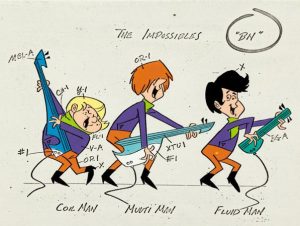 The Impossibles convert to their alter-identities of Coil Man, Fluid Man, and Multi-Man. They don’t have to investigate long, as the Batter reveals himself from behind the outfield fence, and takes a pot-shot at them with a baseball-firing bazooka. Coil Man launches himself at the villain, but splats into the wall as the Batter shuts the fence panel in his face. The Batter appears again out of the pitcher’s mound through a secret tunnel, and takes a shot with the bazooka at Fluid Man. As the hero is made of water, the shot has no effect upon him, merely passing through his middle. Another shot connects with Multi-Man, but merely takes out several duplicates rather than the original. The villain descends back into the mound, sliding into his maze of tunnels under the field. Our heroes follow, finding first base and home to also be tunnel entrances, and descend into the lair in three directions to surround their adversary.
The Impossibles convert to their alter-identities of Coil Man, Fluid Man, and Multi-Man. They don’t have to investigate long, as the Batter reveals himself from behind the outfield fence, and takes a pot-shot at them with a baseball-firing bazooka. Coil Man launches himself at the villain, but splats into the wall as the Batter shuts the fence panel in his face. The Batter appears again out of the pitcher’s mound through a secret tunnel, and takes a shot with the bazooka at Fluid Man. As the hero is made of water, the shot has no effect upon him, merely passing through his middle. Another shot connects with Multi-Man, but merely takes out several duplicates rather than the original. The villain descends back into the mound, sliding into his maze of tunnels under the field. Our heroes follow, finding first base and home to also be tunnel entrances, and descend into the lair in three directions to surround their adversary.
In the course of checking out the lair, our heroes locate Randy, imprisoned in novel fashion behind a giant catcher’s mask mounted to the wall. This isn’t the only unnecessary giant prop the Batter has installed within the lair, also having on hand a giant robotic arm to pitch a giant baseball, and another arm holding a giant bat to hit it. The chase and perils thus get pretty silly and stupid, until finally the Batter emerges onto the field above, and decides to seal his adversaries within the catacombs, by blowing up the tunnel exits with dynamite. Unfortunately for him, the Impossibles appear at each base before he can throw the dynamite in, delivering three good socks to the villain that they count as “Three strikes – you’re out”. Final score – Three Impossibles to One battered Batter. Nothing left to do but to ride off into the sunset, as Randy rejoins the team.
• Let us know if you can find this one online. We can’t.
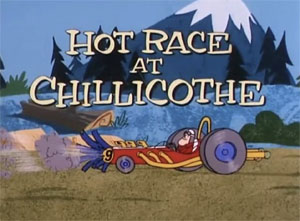 Hot Race at Chillicothe (Wacky Races, 11/2/68) – A typically random and wayward script for the series takes an unexpected (and probably uncalled-for) side trip into a baseball park. To attempt to scare the Ant Hill Mob out of the race, Dick Dastardly and Muttley hijack an empty police car, pretending to be highway patrol in pursuit of the mob. The pint-sized hoods duck their car into an Itty-Bitty League ball park, and make for the locker room as a hideout. Dastardly suddenly is forced to change roles, from pursuer to pursued, as the angry policeman who left his car unattended pursues Dastardly to apprehend the car thieves. Dick follows the Ant Hill Mob’s lead by also running into the locker room, and he and Muttley emerge in uncustomary white baseball uniforms. The Ant Hill Mob also emerges, dressed in the visiting team’s colors, and make like widdle kids. So, what other choice is there, but to stage a game? Even when the winning doesn’t count, Dastardly can’t resist being a cheater. He gets a quick out on the Ant Hill leader, by pitching him a ball of solid steel. The batter can only return the ball as far as the mound, while vibrating in place from the impact of the heavy ball upon his bat. Dastardly somehow takes no ill effect from catching the steel orb in his mitt, and the next batter steps to the plate. Dastardly tosses a ball with a bomb in it – oddly, not to explode at the plate, but to divide from the blast into about a dozen baseballs at once, which swamp the batter, using up his strikes on one pitch. Inexplicably, Rufus Roughcut happens by at the park entrance, and doesn’t like the way the big guy is treating the itty-bitty leaguers.
Hot Race at Chillicothe (Wacky Races, 11/2/68) – A typically random and wayward script for the series takes an unexpected (and probably uncalled-for) side trip into a baseball park. To attempt to scare the Ant Hill Mob out of the race, Dick Dastardly and Muttley hijack an empty police car, pretending to be highway patrol in pursuit of the mob. The pint-sized hoods duck their car into an Itty-Bitty League ball park, and make for the locker room as a hideout. Dastardly suddenly is forced to change roles, from pursuer to pursued, as the angry policeman who left his car unattended pursues Dastardly to apprehend the car thieves. Dick follows the Ant Hill Mob’s lead by also running into the locker room, and he and Muttley emerge in uncustomary white baseball uniforms. The Ant Hill Mob also emerges, dressed in the visiting team’s colors, and make like widdle kids. So, what other choice is there, but to stage a game? Even when the winning doesn’t count, Dastardly can’t resist being a cheater. He gets a quick out on the Ant Hill leader, by pitching him a ball of solid steel. The batter can only return the ball as far as the mound, while vibrating in place from the impact of the heavy ball upon his bat. Dastardly somehow takes no ill effect from catching the steel orb in his mitt, and the next batter steps to the plate. Dastardly tosses a ball with a bomb in it – oddly, not to explode at the plate, but to divide from the blast into about a dozen baseballs at once, which swamp the batter, using up his strikes on one pitch. Inexplicably, Rufus Roughcut happens by at the park entrance, and doesn’t like the way the big guy is treating the itty-bitty leaguers.
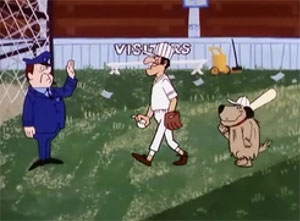 He determines to get into the game himself – and right behind him appear the Slag Brothers, who mumble in gibberish intent to do the same thing. Rufus has his mascot Sawtooth the beaver fix him up an appropriate bat – tooth-carved from the entire trunk of a nearby tree. Rufus immediately comes up as next batter to face Dastardly. It’s the old time-worn gag of socking a hole through Dastardly’s mitt from the force of the blow. The Slags bat next – together, using their own custom clubs. Their double-swat splits the ball into two neat halves, which fly independently. Dastardly tries to catch them both, but they pass on opposite sides of a foul pole, and Dastardly runs smack into the pole in the middle. (Don’t ask me how the play would be scored, since at least half of the ball would seem to be in foul territory.) Without knowing how the top half of the first ever comes to an end, we shift to a scene of Dastardly batting, with Rufus pitching. Rufus appropriately has a pitch that spins like a buzz-saw, contacting the top of Dastardly’s bat, and sawing it clear through down to the handle into two neat halves. Dastardly still tries to tun the bases, but finds the cop waiting for him at first. Dastardly reverses direction, presumably headed for the stadium exit, as he calls out for help to “Muttley!” And that’s all we see of how the game resolves.
He determines to get into the game himself – and right behind him appear the Slag Brothers, who mumble in gibberish intent to do the same thing. Rufus has his mascot Sawtooth the beaver fix him up an appropriate bat – tooth-carved from the entire trunk of a nearby tree. Rufus immediately comes up as next batter to face Dastardly. It’s the old time-worn gag of socking a hole through Dastardly’s mitt from the force of the blow. The Slags bat next – together, using their own custom clubs. Their double-swat splits the ball into two neat halves, which fly independently. Dastardly tries to catch them both, but they pass on opposite sides of a foul pole, and Dastardly runs smack into the pole in the middle. (Don’t ask me how the play would be scored, since at least half of the ball would seem to be in foul territory.) Without knowing how the top half of the first ever comes to an end, we shift to a scene of Dastardly batting, with Rufus pitching. Rufus appropriately has a pitch that spins like a buzz-saw, contacting the top of Dastardly’s bat, and sawing it clear through down to the handle into two neat halves. Dastardly still tries to tun the bases, but finds the cop waiting for him at first. Dastardly reverses direction, presumably headed for the stadium exit, as he calls out for help to “Muttley!” And that’s all we see of how the game resolves.
• “Hot Race at Chillicothe” is on the Internet Archive.
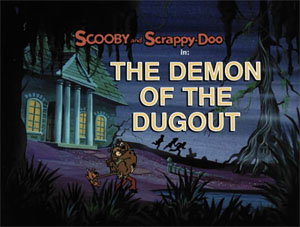 Though I may have to check a little further to see if there are additional instances of baseball appearing in the many editions of the Scooby Doo franchise (there is at least one more in “What’s New, Scooby Doo?”), two episodes come to the surface from initial research, which we’ll include here to close out this week’s coverage. The Demon of the Dugout (Scooby Doo and Scrappy Doo, 11/3/79) takes the gang to Japan, where an international competition is under way between Japan and the U.S. As this would seem to have been before pro-players were allowed to compete in some Olympic competitions, it might be presumed that we are dealing with players on an amateur status, vying to bring home a trophy for their nations.
Though I may have to check a little further to see if there are additional instances of baseball appearing in the many editions of the Scooby Doo franchise (there is at least one more in “What’s New, Scooby Doo?”), two episodes come to the surface from initial research, which we’ll include here to close out this week’s coverage. The Demon of the Dugout (Scooby Doo and Scrappy Doo, 11/3/79) takes the gang to Japan, where an international competition is under way between Japan and the U.S. As this would seem to have been before pro-players were allowed to compete in some Olympic competitions, it might be presumed that we are dealing with players on an amateur status, vying to bring home a trophy for their nations.
Apparently, the trophy of the event has consistently stayed in Japan for many consecutive years, but for the first time, Team U.S.A. has a good chance of taking a deciding game, and receiving the honor of bringing back the trophy to the States for the year. It seems, however, that someone wants to make sure this doesn’t happen. Before the game can be played out, a weird biped with claws and facial features supposedly resembling a dragon, appears in a puff of smoke out of the pitcher’s mound, warning all that they have desecrated his resting place long enough, and to leave the stadium immediately. As the clouds of smoke rise, the creature descends back into them, but seems to expand tremendously in size, as if towering over the stands. That is enough to send fans and team members running.
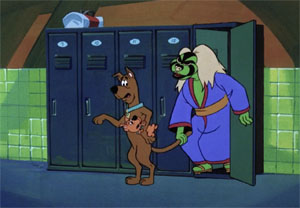 The Scooby gang are late arriving in town, and figure they missed the game, but hope to see a final round tomorrow. They are met with the surprising sight of the manager of Team U.S.A., quarreling with a ticket agent about being unable to get an immediate flight home for himself and his boys. Inquiring as to his reasons for wanting to leave, the Scooby gang is informed by the manager of the dragon beast’s mysterious appearance, and the manager’s wish not to keep his boys in a place where they may be subject to danger. Sounds like a mystery to solve, concludes Fred and Scrappy. Shaggy can only remark, “We came all the way to Japan just to chase a ghost again?” Velma replies, “Let me put it this way – yes.”
The Scooby gang are late arriving in town, and figure they missed the game, but hope to see a final round tomorrow. They are met with the surprising sight of the manager of Team U.S.A., quarreling with a ticket agent about being unable to get an immediate flight home for himself and his boys. Inquiring as to his reasons for wanting to leave, the Scooby gang is informed by the manager of the dragon beast’s mysterious appearance, and the manager’s wish not to keep his boys in a place where they may be subject to danger. Sounds like a mystery to solve, concludes Fred and Scrappy. Shaggy can only remark, “We came all the way to Japan just to chase a ghost again?” Velma replies, “Let me put it this way – yes.”
The gang first checks with a Mr. Husai, owner of the stadium. They are shown the trophy which was intended to go to the winner – atop which rests the fabulous “Baseball Diamond”, a huge round jewel held in the hands of a golden baseball player, which rests inside a domed glass container. Mr. Husai places the trophy into a safe for safe-keeping, and informs the gang that there may be no more games thanks to the appearance of the beast, and he may be forced to sell the stadium. Luckily, Husai states he has other businesses around Tokyo that need his attention, so as to the stadium sale, he states “If I must, I must.” (Interesting. Who would want to buy it with the beast around?)
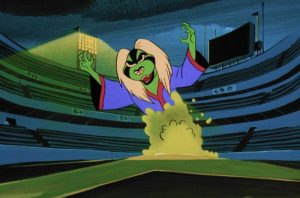 The usual snooping and skulking takes place, with the beast appearing again with the same act to frighten the gang. Aside from the extending-in-the-mist bit, the beast seems to be all talk and no action. Then, to make things odder, he shows up at the gang’s hotel, minus the smoke, and seems even less intimidating except for his growls. Velma is as usual investigating clues stumbled upon by Shaggy, Scooby, and Scrappy. Some high-intensity floodlights are discovered in the room controlling the scoreboard. The beast is tracked to a fireworks factory, in which every crate, held closed with binding straps, seems to be labeled for delivery to the USA. Velma plays a hunch after the beast escapes again, and the gang return to Mr. Husai’s office. She asks to make sure that the Baseball Diamond is still in the safe. Husai opens it, and Velma lifts the trophy out, stating “It looks all right. Suddenly, she appears to stumble, and the trophy is jostled sideways in her arms. Velma catches it, vibrating the trophy somewhat against the inner wall of its glass dome encasement. “Not even a scratch”, she states, uprighting the trophy with care and handing it back to Husai.
The usual snooping and skulking takes place, with the beast appearing again with the same act to frighten the gang. Aside from the extending-in-the-mist bit, the beast seems to be all talk and no action. Then, to make things odder, he shows up at the gang’s hotel, minus the smoke, and seems even less intimidating except for his growls. Velma is as usual investigating clues stumbled upon by Shaggy, Scooby, and Scrappy. Some high-intensity floodlights are discovered in the room controlling the scoreboard. The beast is tracked to a fireworks factory, in which every crate, held closed with binding straps, seems to be labeled for delivery to the USA. Velma plays a hunch after the beast escapes again, and the gang return to Mr. Husai’s office. She asks to make sure that the Baseball Diamond is still in the safe. Husai opens it, and Velma lifts the trophy out, stating “It looks all right. Suddenly, she appears to stumble, and the trophy is jostled sideways in her arms. Velma catches it, vibrating the trophy somewhat against the inner wall of its glass dome encasement. “Not even a scratch”, she states, uprighting the trophy with care and handing it back to Husai.
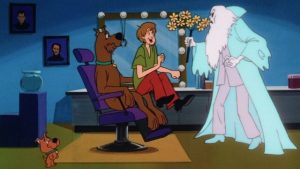 Eventually, these clues lead to an unmasking that is no surprise to Velma. Mr. Husai is the dragon beast. Fireworks were used to produce the smoke at the stadium, and the stretch-image was supposedly projected upon the smoke by means of the scoreboard’s high-intensity bulbs. (Yeah, let’s see that work in real life,) Husai had a tunnel under the pitcher’s mound to make his live appearance before the smoke act, and further investigation at the fireworks factory revealed that the straps on either side of the crate lettering “USA” reveled the hidden first letter “H” and the hidden last letter “I” – the factory being one of the other enterprises Husai owned. And the motive? The diamond in the trophy was a fake, having been swapped out by Husai years ago (that’s why it wouldn’t cut glass when Velma jostled the trophy against the domed encasement), and Husai was attempting to cover up the theft by preventing the trophy from leaving the country. (So, is losing an entire baseball stadium for what would be a drastically-reduced price upon resale actually worth the price of the stolen diamond? Did Husai fence the real diamond so that he couldn’t just return the stone, which would be the only way the result would seem to make economic sense to get himself out of a theft rap?) Scooby and Scrappy end the episode by setting off a fireworks display, the first rocket spraying an image of Scooby in the sky. (How did these dogs learn pyrotechnics?) The second rocket is supposed to display a picture of Scrappy, but instead displays a dragon that frightens the Scooby image away. “Wrong rocket”, apologizes Scrappy.
Eventually, these clues lead to an unmasking that is no surprise to Velma. Mr. Husai is the dragon beast. Fireworks were used to produce the smoke at the stadium, and the stretch-image was supposedly projected upon the smoke by means of the scoreboard’s high-intensity bulbs. (Yeah, let’s see that work in real life,) Husai had a tunnel under the pitcher’s mound to make his live appearance before the smoke act, and further investigation at the fireworks factory revealed that the straps on either side of the crate lettering “USA” reveled the hidden first letter “H” and the hidden last letter “I” – the factory being one of the other enterprises Husai owned. And the motive? The diamond in the trophy was a fake, having been swapped out by Husai years ago (that’s why it wouldn’t cut glass when Velma jostled the trophy against the domed encasement), and Husai was attempting to cover up the theft by preventing the trophy from leaving the country. (So, is losing an entire baseball stadium for what would be a drastically-reduced price upon resale actually worth the price of the stolen diamond? Did Husai fence the real diamond so that he couldn’t just return the stone, which would be the only way the result would seem to make economic sense to get himself out of a theft rap?) Scooby and Scrappy end the episode by setting off a fireworks display, the first rocket spraying an image of Scooby in the sky. (How did these dogs learn pyrotechnics?) The second rocket is supposed to display a picture of Scrappy, but instead displays a dragon that frightens the Scooby image away. “Wrong rocket”, apologizes Scrappy.
• “The Demon of the Dugout” is on the Internet Archive
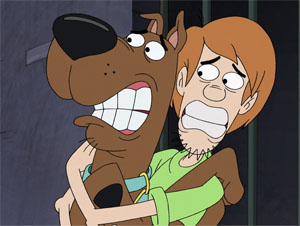 Grand Scam is a late one, produced post-Hanna-Barbera by Warner animation for the series, “Be Cool, Scooby Doo” (10/9/15). In this version, the gang are drawn off-model, with some facial expressions looking like they may have been borrowed from Seth MacFarlane’s “Family Guy”, and some of the cast act more goofy than usual, playing things more for laughs (particularly Daphne, who seems more of a ditz than we’ve ever seen her before). But there is still a sense of Scooby writing about in in many respects, and this episode actually features some surprises, in a turn-around for Shaggy, where he finds himself, in spite of his baser instincts, forced to face some risky situations with a certain degree of backbone.
Grand Scam is a late one, produced post-Hanna-Barbera by Warner animation for the series, “Be Cool, Scooby Doo” (10/9/15). In this version, the gang are drawn off-model, with some facial expressions looking like they may have been borrowed from Seth MacFarlane’s “Family Guy”, and some of the cast act more goofy than usual, playing things more for laughs (particularly Daphne, who seems more of a ditz than we’ve ever seen her before). But there is still a sense of Scooby writing about in in many respects, and this episode actually features some surprises, in a turn-around for Shaggy, where he finds himself, in spite of his baser instincts, forced to face some risky situations with a certain degree of backbone.
A minor-league baseball team from Shaggy’s home town, the Middleton Gypsy Moths, has the usual kind of problem. The white reflecting ghost of one of their legendary stars from the turn of the century. Chip Braverton, seems to be interfering with the games, appearing on the field in mid-play, and seizing the pitcher’s arm to prevent tossing of the pitch. Everyone runs in panic as usual, and as Shaggy and the gang roll into town, all they find at the stadium is the Gypsy Moths’ character mascot. The young man inside dumps the costume, claiming he signed up for cheering, rooting, and mild gymnastics – not ghosts. “No, no, no, not here”, moans Shaggy, as Fred is about to turn the subject to the gang’s usual preoccupation. When Daphne states that maybe there’s something they can do about it, Scooby suggest, “Yeah. Run away.” He begins to scamper off, but notices his usual compadre is not running with him. “Shaggy?“, questions Scoob. “Not this time”, responds Shaggy surprisingly. He’s followed this team from childhood, and they never let him down. “My team needs me.” And so, admitting that he himself doesn’t believe he’s saying this, Shaggy declares, “We’ve got a m-m-m…, a m-m-m…MYSTERY to solve!”
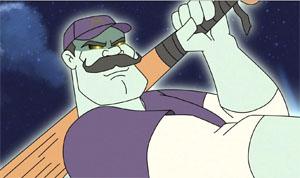 The gang meet the team’s owner, who instantly recognizes Shaggy as the team’s number one fan (recalling happier times when Shaggy broke the stadium record for number of hot dogs consumed – by eating all of them). He informs them of the ghost appearances, and declares he may have to dissolve the team and sell the stadium. Shaggy is amazed that Braverton should be the ghost, being the player holding the best stats in the team history. Velma, who has expressed her lack of interest in the sport of baseball (despite her earlier experience in Japan above), suddenly brightens when she hears of baseball stats. Envisioning crunching the numbers of batting averages, ERA’s, etc., she remarks that mathematics can make anything fun. Daphne meanwhile can’t resist trying on the discarded gypsy moth suit of the mascot, and begins ad-libbing encouraging cheers to the gang to solve the mystery – noting as she goes how difficult it is to come up with appropriate rhymes for her chants.
The gang meet the team’s owner, who instantly recognizes Shaggy as the team’s number one fan (recalling happier times when Shaggy broke the stadium record for number of hot dogs consumed – by eating all of them). He informs them of the ghost appearances, and declares he may have to dissolve the team and sell the stadium. Shaggy is amazed that Braverton should be the ghost, being the player holding the best stats in the team history. Velma, who has expressed her lack of interest in the sport of baseball (despite her earlier experience in Japan above), suddenly brightens when she hears of baseball stats. Envisioning crunching the numbers of batting averages, ERA’s, etc., she remarks that mathematics can make anything fun. Daphne meanwhile can’t resist trying on the discarded gypsy moth suit of the mascot, and begins ad-libbing encouraging cheers to the gang to solve the mystery – noting as she goes how difficult it is to come up with appropriate rhymes for her chants.
Various clues turn up along the way. Another individual is found remaining at the stadium – a young athlete, axed from the team for low batting average, but given a job as caretaker of the stadium, who seems to spend more time trying to brag about his meager record with the team than in taking care of the grounds and stadium museum – where more is learned about Chip Braverton, including his baseball card with all his stats (intriguing Velma). In the dugout are found trails of small white glistening dots. The ghost makes multiple appearances, but is warded off in one instance by Daphne, turning a rapid-fire pitching machine upon him. The ghost only succeeds in swatting away a handful of balls, then flees. All the while, Shaggy, remembering the team motto that a Gypsy Moth never goes down without a fight, acts uncharacteristically brave in the face of danger. Scooby begins to give gim a treatment as if to say, “I don’t know you”, believing that Shaggy has resigned from their two-man club of cowards, to a point where Scooby no longer recognizes him as his friend. Finally, a trap is laid, with someone needed to act as bait. Shaggy, realizing he’s had more experience than anyone else in being chased, again finds in his heart the Gypsy Moth spirit, and volunteers for the assignment, emphasizing the need for him to participate in “Teamwork.” To his surprise, Scooby joins him at home plate on the empty field, finally ready to accept Shaggy’s new attitude, and declaring. as his own reason for joining Shaggy as bait, the motto, “Teamwork.” Scooby asks if Shaggy is ready, to which Shaggy admits, “Not at all. Let’s do this.”
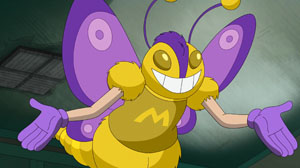 Shag and Scoob begin uttering jeering remarks at the top of their lungs to the empty field. “Hey, batter, batter, batter…” chants Shaggy. “Easy out. Easy out”, repeats Scooby. The ghost can’t resist the challenge, and appears, raising his bat high and ready to club the two over their heads. Suddenly, ropes are cut by other members of the gang, and Shaggy and Scooby split up in opposite directions, as the netting from the backstop falls atop the ghost, seemingly pinning him down and/or knocking him out. But only for a moment, as the ghost rises under the net with a fierce roar – only to be knocked cold by a well-placed shot from the pitching machine on the back of his head. At the machine stands Daphne in her gypsy moth costume, who shouts to the ghost, “Hit the showers.”
Shag and Scoob begin uttering jeering remarks at the top of their lungs to the empty field. “Hey, batter, batter, batter…” chants Shaggy. “Easy out. Easy out”, repeats Scooby. The ghost can’t resist the challenge, and appears, raising his bat high and ready to club the two over their heads. Suddenly, ropes are cut by other members of the gang, and Shaggy and Scooby split up in opposite directions, as the netting from the backstop falls atop the ghost, seemingly pinning him down and/or knocking him out. But only for a moment, as the ghost rises under the net with a fierce roar – only to be knocked cold by a well-placed shot from the pitching machine on the back of his head. At the machine stands Daphne in her gypsy moth costume, who shouts to the ghost, “Hit the showers.”
The unmasking of course turns up the caretaker as the culprit. The owner wonders why he would want to sabotage the team, since he had been given a good job. Fred remarks that he never forgave the manager for cutting him from the team, and acted upon the old motto that a Gypsy Moth doesn’t go down without a fight. Velma reveals stats that show that Chip Braverton was a right-hander, while the caretaker batted left. Also, that the small percentage of balls the caretaker hit from the pitching machine matched the caretaker’s own batting average of .154. His ghost appearance was achieved by coating himself in the white powder used to mark the baselines – accounting for the dots on the dugout floor from his cleats. Shaggy is rewarded with the honor of tossing out the first pitch at the next game. He accepts, as long as his pal Scooby can act as catcher. They appear at the next evening’s game. But Shaggy’s pitch is one for the books. Not of a baseball, but of a hot dog with all the fixings. He pitches it right over the plate into Scooby’s mouth. Scooby chomps off half of it, then tosses it back to Shaggy, who makes a perfect catch of the other half into his own mouth – ending their perfect double-play.
• There are some clips available from “Grand Scam” in varying condition. The best is probably on You Tube HERE – but its poorly shot off a screen, and the sound is awful.
NEXT WEEK: We’ll turn to some other ‘60’s studios for a while.